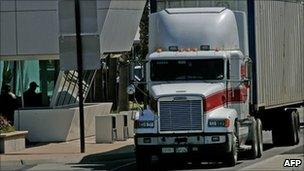US and Mexico end cross-border trucking dispute
- Published

A pilot programme to allow Mexican trucks to circulate will now resume
US and Mexico have signed a deal to allow their trucks to use each other's roads, after a 17-year dispute.
The 1994 North American Free Trade Agreement called for Mexican trucks to have full access to US highways, but they were kept to a border buffer zone.
In 2009, Mexico imposed higher tariffs on dozens of US products in response.
Officials said the deal would address safety concerns over Mexican vehicles. Business groups welcomed the accord but US trucking unions have condemned it.
Under Nafta, US and Mexican carriers were authorised to cross the border.
But the the US refused to allow Mexican trucks full access, citing concerns of their ability to meet US safety and environmental standards.
Mexican vehicles have generally been allowed no further than 40km (25 miles) into the US.
Checks and tests
Funding for a pilot programme to allow long-haul Mexican trucks to circulate in the US was cut in 2009, prompting Mexico to slap tariffs on a range of US agriculture and industrial products.
Announcing the deal in Mexico City, US Transportation Secretary Ray LaHood said it would "create jobs and opportunity for our people and support economic development in both nations".
US Agriculture Secretary Tom Vilsack said ending the dispute, which had cost US businesses more than $2BN (£1.2bn) a "major win for US agriculture, American jobs and our nation's economic prosperity".
Under the deal, the pilot programme will be reinstated with Mexican lorry drivers getting a provisional 18-month licence that may lead to permanent approval.
Electronic monitoring systems will be mandatory to keep a record of how long the vehicles are in service.
Mexican lorry drivers will only be allowed to do cross-border runs, not deliver between US destinations.
Other requirements will include safety reviews, drug tests, and drivers will be assessed on their English-language proficiency.
Mexico is to lift half of the tariffs it imposed immediately, with the rest suspended when the first Mexican lorry driver is authorised to travel into the US.
But opponents voiced fury at the agreement.
"Opening the border to dangerous trucks at a time of high unemployment and rampant drug violence is a shameful abandonment of the DOT's (US Department of Transportation) duty to protect American citizens from harm and to spend American tax dollars responsibly," union leader Jim Hoffa said.
Mr Hoffa, the General President of the International Brotherhood of Teamsters, said in a statement , externalthat the pilot programme was a concession to multinational corporations that send jobs to Mexico.
"It endangers motorists. It ignores the rampant corruption among Mexican law enforcement. It lowers wages and robs jobs from hard-working American truck drivers and warehouse workers," he said.
In a sign that the arguing is not over, Congressman Peter DeFazio has tabled a bill to block the Obama administration from implementing the programme.
He said concerns over safety, security and loss of jobs had not been met, the Associated Press news agency reported.
- Published4 March 2011
- Published3 March 2011